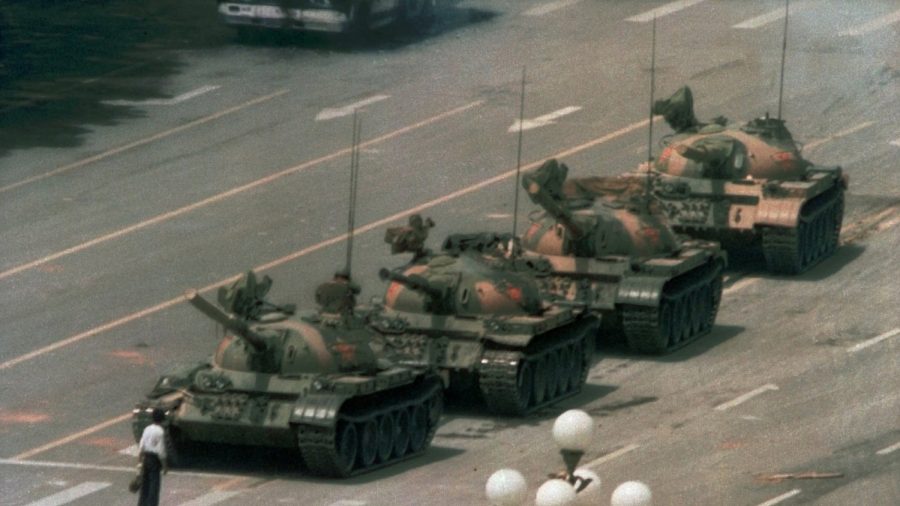The Chinese Communist Party is exporting its tyranny all over the world after the United States let it get away with murder 33 years ago during the Tiananmen Square Massacre, three Chinese activists say.
It was a bloody night for pro-democracy student protestors on June 3, 1989. Tanks rolled in towards Tiananmen Square, the heart of China’s capital, crushing people and objects in their way. Tear gas and live ammunition inundated the square.
Panicked protesters propped limp bodies onto bikes, buses, and ambulances to ferry them away. Thousands of unarmed protesters are estimated to have died.
The mass murder shocked the world. In response, then-U.S. President George H.W. Bush condemned the massacre, suspended arms shipments to China, and imposed some sanctions.
“But they moved on quickly,” said Li Hengqing, a former 1989 student leader who now lives in Washington. Li pointed out that most sanctions were soon lifted and the economic engagement resumed.
At the press conference held a day after the Tiananmen Massacre, Bush said, “I happen to believe that the commercial contacts have led, in essence, to this quest for more freedom. I think as people have commercial incentive, whether it’s in China or in other totalitarian systems, the move to democracy becomes more inexorable.”
Describing the theory as “extremely ridiculous,” Yuan Hongbing, a Chinese scholar who was later suspended from duty for participating in the Tiananmen protests, said Washington’s policy of engagement with China benefited the CCP and helped the communist regime accumulate economic power in the following three decades.

“The West’s [response] emboldened the CCP,” said Chen Weijian, a Chinese commentator who left China for New Zealand two years after the Tiananmen clampdown.
After 33 years, “economic development hasn’t led to a free China,” said Chen, who was the founder of a Chinese pro-democracy magazine and investigated for supporting the 1989 demonstrations. Instead, the CCP is seeking to use economic power to “change the rule of the international community” and export its suppressive model of control to the entire world.
Chen cited a conversation between Chinese leader Xi Jinping and U.S. President Joe Biden.
During a recent speech to the Naval Academy’s graduating class, Biden said that Xi told him that democracy would fall and “autocracies will run the world.”
“When he called me to congratulate me on election night, he said to me what he said many times before,” Biden said on May 27, referring to Xi. “He said, “Democracies cannot be sustained in the 21st century. Autocracies will run the world. Why? Things are changing so rapidly. Democracies require a consensus, and it takes time, and you don’t have the time.”
“He’s wrong,” Biden added.
Censored in China
Hong Kong, the last place to commemorate the victims of the 1989 massacre on CCP-controlled soil, banned the mass vigils three years ago, citing the pandemic, amid a wider clampdown of freedoms of in the city at the hands of the communist regime.
The leaders of the group behind the annual vigil is currently held in custody after being charged for subversion under the CCP-imposed national security law. They are among over 150 people who have been charged or convicted under the draconian law that has been used to wipe out dissent in the once-thriving democratic hub.
On this year’s anniversary, dozens of police patrolled Victoria Park, where the annual candlelight vigil was previously held.

In mainland China, the Tiananmen Square protests, a youth-led movement advocating for democratic reforms, is still a taboo subject. To this day, the Chinese communist regime won’t disclose the number or names of those killed in the violent clampdown.
The regime has tried to erase all memories of the bloody massacre by scrubbed every mention of the event on the country’s internet, and frequently harassing relatives of the victims to ensure they stay silent. As a result, younger generations of Chinese are unaware of what happened that night.
Though the regime continues to suppress memories of the day , Secretary of State Antony Blinken said the United States will “continue to speak out and promote accountability for the Chinese regime’s atrocities and human rights abuse by it, including those in Hong Kong, Xinjiang, and Tibet.”
“To the people of China and to those who continue to stand against injustice and seek freedom, we will not forget June 4,” he said in a June 3 statement.
Pandemic
This year, Tiananmen Square has been locked down weeks ahead of June 4, as part of the pandemic prevention measures under the regime’s “zero-COVID” policy. The draconian approach, aimed at eliminating every infection within communities by imposing lockdowns and mandatory quarantine, has caused food shortages and delayed medical care for millions under lockdown across the country.

“The [CCP] was to control the virus through an approach that has no respect for basic human rights, which is the same as the way it did on June 4,” said Chen.
For Chen, the case of Li Wenliang, a doctor who was among the first to raise the alarm about the initial COVID-19 outbreak in Wuhan, was a reminder to the world about how the CCP’s suppression could affect them. The doctor was reprimanded by police in January 2020 as the authorities tried to downplay the severity of the outbreak. Li later died of the virus.
Chen added the current pandemic would be different if the regime didn’t censor the whistleblower and others who tried to sound the alarm.
“Finally, the world is starting to understand the CCP now,” he said.
Luo Ya and Eva Fu contributed to this report.
From The Epoch Times

